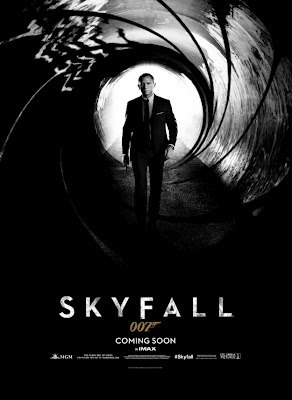 Skyfall (2012, Dir. Sam Mendes):
Skyfall (2012, Dir. Sam Mendes):
“Don’t cock it up.” These are the words spoken by a bureaucratic apparatchik to James Bond in Skyfall, and they’re the words on our minds every time the latest 007 opus zips into the cinemas. Indeed, when series godfather and original co-producer Albert “Cubby” Broccoli handed over the keys to the kingdom to his successors (daughter Barbara and stepson Michael G. Wilson) his prime piece of advice was “Don’t screw it up.”
That overriding pressure to not cock up has both constrained and liberated the Bond franchise in recent years. After playing it safe and giving the audience exactly what it wanted (or at least, what it was perceived the audience wanted) with a decade of muddle-some Pierce Brosnan films, the producers unleashed Die Another Day (2002) on the series’ 40th anniversary. A sloppy potpourri of Bond’s greatest hits, it was boffo box office and an artistic dead end. Most Hollywood execs would have seen the dollar signs and happily milked that particular cash cow up to Die Another Day III or IV, but give Broccoli and Wilson credit — sensing that Bond needed to stay relevant, they cast Daniel Craig in the role, resuscitating the saga with Casino Royale (2006). Yet, the question lingers: is there still a place for Bond in a cinematic landscape dominated by hard-hitting, “real-world” suspense thrillers and superhero epics?
Quantum of Solace (2008) attempted to solve the problem by depositing a down-and-dirty Bond, Jason Bourne-style, on backwater locations. Instead of exotic vistas and villainous plans to rule the world, we had the incongruous sight of Her Majesty’s Secret Servant trudging through Bolivian villages paralyzed by drought, preoccupied with Realpolitik, his style as parched as the baked desert. Choked by frenzied editing and a story that squandered the emotional coda to Casino, Quantum marked a perilous tipping point: would Bond, as an institution, continue to lose himself in the anonymity of the glum modern-day thriller, or would he retreat to past form and essentially declare himself a relic?
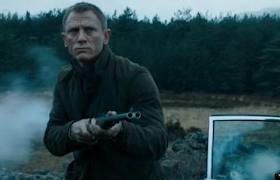 Which brings us to the curious case of Skyfall, which opts to burn that candle at both ends. The film is fully aware of Bond’s tenuous grip on the Zeitgeist, as the first words out of M’s (Judi Dench) mouth are “We all know what’s at stake here.” Oh yes, we do. If the producers weren’t feeling enough heat after a four-year hiatus, the film’s release comes on the 50th anniversary of Dr. No, and you can feel the weight of the expectations and all that history from the get-go. The relevance of MI6 (and by extension Bond) are in open question after a failed mission leaves Bond wounded (by friendly fire, on M’s orders), MIA, and presumed dead; with the identities of agents embedded in terrorist cells at risk, a disapproving establishment is ready to send M packing. Meanwhile, a physically and emotionally scarred Bond is content to lie low, whiling away his days with drinking games and local lovelies on the beach, but when MI6 headquarters is bombed, loyalty to country and M, the sole maternal figure in his life, trumps all, sending him back into the fold to seek out the terrorist behind the attacks. When governmental overseer Gareth Mallory (an understated Ralph Fiennes) asks Bond point-blank, “Why not stay dead?” he may just as well be asking on behalf of skeptical critics and fans everywhere.
Which brings us to the curious case of Skyfall, which opts to burn that candle at both ends. The film is fully aware of Bond’s tenuous grip on the Zeitgeist, as the first words out of M’s (Judi Dench) mouth are “We all know what’s at stake here.” Oh yes, we do. If the producers weren’t feeling enough heat after a four-year hiatus, the film’s release comes on the 50th anniversary of Dr. No, and you can feel the weight of the expectations and all that history from the get-go. The relevance of MI6 (and by extension Bond) are in open question after a failed mission leaves Bond wounded (by friendly fire, on M’s orders), MIA, and presumed dead; with the identities of agents embedded in terrorist cells at risk, a disapproving establishment is ready to send M packing. Meanwhile, a physically and emotionally scarred Bond is content to lie low, whiling away his days with drinking games and local lovelies on the beach, but when MI6 headquarters is bombed, loyalty to country and M, the sole maternal figure in his life, trumps all, sending him back into the fold to seek out the terrorist behind the attacks. When governmental overseer Gareth Mallory (an understated Ralph Fiennes) asks Bond point-blank, “Why not stay dead?” he may just as well be asking on behalf of skeptical critics and fans everywhere.
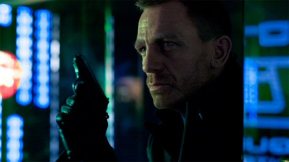 Fortunately, Skyfall provides plenty of reasons for Bond to stick around for at least a little longer. It’s a cleaner, crisper affair than Quantum, and even though the snarky digs at Bond’s age and relevance are overplayed after a while, director Sam Mendes shows that the old dog still has a few new tricks. The neatest trick of all is how it brings the series full-circle and yet pushes it forward: we get the pleasure of a few totems from days of yore — a certain Aston Martin DB5 for instance — but we also get new spins on old standbys, such as Ben Whishaw’s Q, now a cocky computer nerd more content to putter on his laptop than provide agents with gee-whiz gadgetry (“Were you expecting an exploding pen? We don’t go in for that sort of thing anymore”). The film concludes with a visual and spiritual callback to the Sean Connery era, as if to say, “Relax, we’re not forgetting our roots,” even as it insists on Bond’s usefulness in a “brave new world” stuffed with terrorism and electronic threats. It’s also one of the handsomest-looking Bonds, with cinematographer Roger Deakins bathing the major set-pieces (a fistfight in a Shanghai skyscraper awash with mirrors and neon light, a chase through London’s Underground) with shadows and style.
Fortunately, Skyfall provides plenty of reasons for Bond to stick around for at least a little longer. It’s a cleaner, crisper affair than Quantum, and even though the snarky digs at Bond’s age and relevance are overplayed after a while, director Sam Mendes shows that the old dog still has a few new tricks. The neatest trick of all is how it brings the series full-circle and yet pushes it forward: we get the pleasure of a few totems from days of yore — a certain Aston Martin DB5 for instance — but we also get new spins on old standbys, such as Ben Whishaw’s Q, now a cocky computer nerd more content to putter on his laptop than provide agents with gee-whiz gadgetry (“Were you expecting an exploding pen? We don’t go in for that sort of thing anymore”). The film concludes with a visual and spiritual callback to the Sean Connery era, as if to say, “Relax, we’re not forgetting our roots,” even as it insists on Bond’s usefulness in a “brave new world” stuffed with terrorism and electronic threats. It’s also one of the handsomest-looking Bonds, with cinematographer Roger Deakins bathing the major set-pieces (a fistfight in a Shanghai skyscraper awash with mirrors and neon light, a chase through London’s Underground) with shadows and style.
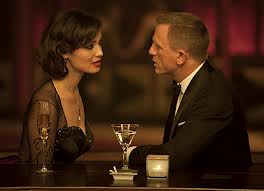 Even though Skyfall includes most of the usual formula elements, it is nothing if not ambitious — straying from the track of the usual Bond plot, the story gets more intimate as it goes, and what at first seems to be a global threat is revealed to be a personal vendetta by Raul Silva (overplayed with relish by Javier Bardem, who turns every tsk-tsk and wince into high comedy), a former MI6 agent looking to do nothing more than personally rub M out. In line with that narrowed focus, the film mostly jettisons the lux travelogue trappings in favor for an overlong second-act stay in Bond’s home turf of Merry Old England, one that makes thematic sense but leaves one missing some of the sinful glamor of past Bonds. Mendes, being the art-house maven he is, can’t resist inflating the film’s subtext to supertext: Bond and Silva are mirror images of each other, both burned by M, their struggle distilled to a duel between momma’s boys (perhaps it’s no accident that Silva, a flaming homosexual, seeks motherly approval in vain). For good measure, Mendes throws in plenty of death and resurrection motifs (everything from a floating casino that would sit nicely on the River Styx to the animated skulls and headstones in the title sequence), an explication of a J.M.W. Turner painting, and a Tennyson quote (from “Ulysses,” whose odyssey is mirrored by Bond’s). Heady stuff, and while the fizzy script by John Logan, Neil Purvis and Robert Wade manages to rein all these elements in, it’s a little shaky when it comes to presenting an edgy, of-the-moment take on espionage — for all the emphasis on hacking and firewalls, the most sophisticated it gets is some squiggles on a computer screen that are meant to represent encryption.
Even though Skyfall includes most of the usual formula elements, it is nothing if not ambitious — straying from the track of the usual Bond plot, the story gets more intimate as it goes, and what at first seems to be a global threat is revealed to be a personal vendetta by Raul Silva (overplayed with relish by Javier Bardem, who turns every tsk-tsk and wince into high comedy), a former MI6 agent looking to do nothing more than personally rub M out. In line with that narrowed focus, the film mostly jettisons the lux travelogue trappings in favor for an overlong second-act stay in Bond’s home turf of Merry Old England, one that makes thematic sense but leaves one missing some of the sinful glamor of past Bonds. Mendes, being the art-house maven he is, can’t resist inflating the film’s subtext to supertext: Bond and Silva are mirror images of each other, both burned by M, their struggle distilled to a duel between momma’s boys (perhaps it’s no accident that Silva, a flaming homosexual, seeks motherly approval in vain). For good measure, Mendes throws in plenty of death and resurrection motifs (everything from a floating casino that would sit nicely on the River Styx to the animated skulls and headstones in the title sequence), an explication of a J.M.W. Turner painting, and a Tennyson quote (from “Ulysses,” whose odyssey is mirrored by Bond’s). Heady stuff, and while the fizzy script by John Logan, Neil Purvis and Robert Wade manages to rein all these elements in, it’s a little shaky when it comes to presenting an edgy, of-the-moment take on espionage — for all the emphasis on hacking and firewalls, the most sophisticated it gets is some squiggles on a computer screen that are meant to represent encryption.
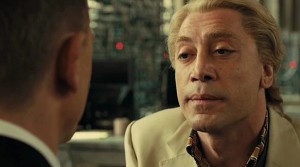 The film, like many other recent Bonds, also lacks follow-through: every supporting character gets a vivid introduction (feisty fellow agent Eve (Naomi Harris), tremulous femme fatale Severine (Berenice Lim Marlohe)) before getting relegated to the background or erased completely from the narrative. Even prime baddie Silva ‘s importance diminishes reel-by-reel after his first grand entrance — he has the outsize personality of a classic Bond villain, but he doesn’t have the scheme (or ultimate comeuppance) to match. Worse yet, the film makes the brave decision to show us a battered, below-par Bond at the outset, leaving us to wonder if he’ll be able to pull himself together before it’s too late — and his journey is promptly abandoned in favor of the kiss-kiss bang-bang of being, well, James Bond.
The film, like many other recent Bonds, also lacks follow-through: every supporting character gets a vivid introduction (feisty fellow agent Eve (Naomi Harris), tremulous femme fatale Severine (Berenice Lim Marlohe)) before getting relegated to the background or erased completely from the narrative. Even prime baddie Silva ‘s importance diminishes reel-by-reel after his first grand entrance — he has the outsize personality of a classic Bond villain, but he doesn’t have the scheme (or ultimate comeuppance) to match. Worse yet, the film makes the brave decision to show us a battered, below-par Bond at the outset, leaving us to wonder if he’ll be able to pull himself together before it’s too late — and his journey is promptly abandoned in favor of the kiss-kiss bang-bang of being, well, James Bond.
What saves Skyfall is Mendes’ focus on Bond and M. Their relationship has always been tetchy, but no other Bond movie has devoted as much time to their near-Oedipal, bickering repartee. Who would have thought that their comedy act would be the funniest thing in the whole shebang? When Bond shows up at M’s apartment, back from the dead, a chastened schoolboy facing his headmistress, he glumly says, “I’ll find a hotel.” Her riposte: “Well, you’re bloody well not staying here.” Later, when M grouses during a getaway in his Aston Martin, Bond quips, “Are you going to complain the whole way?” M’s rejoinder: “Go ahead, eject me, see if I care.” As you would expect, Dench tears up the scenery, as steely as ever even as M reaches her lowest ebb. Her ultimate fate will not be spoiled in this review, but after 17 years snapping orders from behind the scenes, it’s a treat to see her take center stage.
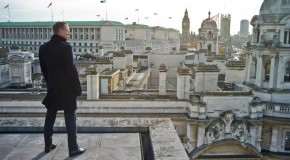 And then there’s Daniel Craig — craggier than ever, his blue eyes burning like two tiny suns, he’s simultaneously the most vulnerable and hardest Bond of them all (he’ll let you see him bleed, but damned if he’s going to acknowledge it). This time out he gets to deploy more charm, and while he isn’t as live-wire as he was in Casino Royale, he comes the closest of all the Bonds to representing the tarnished knight of Ian Fleming’s novels. Just to cement the literary connection, he and M hide out at his family’s ancestral home in Scotland, where we receive a few tantalizing references to his childhood. Some might claim this is a bald-faced attempt to cash in on Christopher Nolan’s Batman films (after all, both Bond and Bruce Wayne are orphans), but Mendes understands that the Bond mythos depends on its mystery, and he quickly moves on to another neat reversal for the film’s climax — usually we have Bond and friendly forces assaulting the villain’s lair, but this time around it’s 007 fighting off the attacking hordes, with the help of gameskeeper Kincade (burly, wry Albert Finney). Small-scaled yet suitably apocalyptic, it’s the best finale for a Bond film in years (even if the ultimate payoff is rushed), and when all’s said and done, Bond’s literary (and recent cinematic) past are burned to ashes, and he emerges, phoenix-like, ready for another bout. With all its leanings towards being a “prestige picture,” Skyfall might lack the zest of the best Bond adventures, but in openly acknowledging itself as a transitional film, it earns our goodwill and a unique place in the canon.
And then there’s Daniel Craig — craggier than ever, his blue eyes burning like two tiny suns, he’s simultaneously the most vulnerable and hardest Bond of them all (he’ll let you see him bleed, but damned if he’s going to acknowledge it). This time out he gets to deploy more charm, and while he isn’t as live-wire as he was in Casino Royale, he comes the closest of all the Bonds to representing the tarnished knight of Ian Fleming’s novels. Just to cement the literary connection, he and M hide out at his family’s ancestral home in Scotland, where we receive a few tantalizing references to his childhood. Some might claim this is a bald-faced attempt to cash in on Christopher Nolan’s Batman films (after all, both Bond and Bruce Wayne are orphans), but Mendes understands that the Bond mythos depends on its mystery, and he quickly moves on to another neat reversal for the film’s climax — usually we have Bond and friendly forces assaulting the villain’s lair, but this time around it’s 007 fighting off the attacking hordes, with the help of gameskeeper Kincade (burly, wry Albert Finney). Small-scaled yet suitably apocalyptic, it’s the best finale for a Bond film in years (even if the ultimate payoff is rushed), and when all’s said and done, Bond’s literary (and recent cinematic) past are burned to ashes, and he emerges, phoenix-like, ready for another bout. With all its leanings towards being a “prestige picture,” Skyfall might lack the zest of the best Bond adventures, but in openly acknowledging itself as a transitional film, it earns our goodwill and a unique place in the canon.





